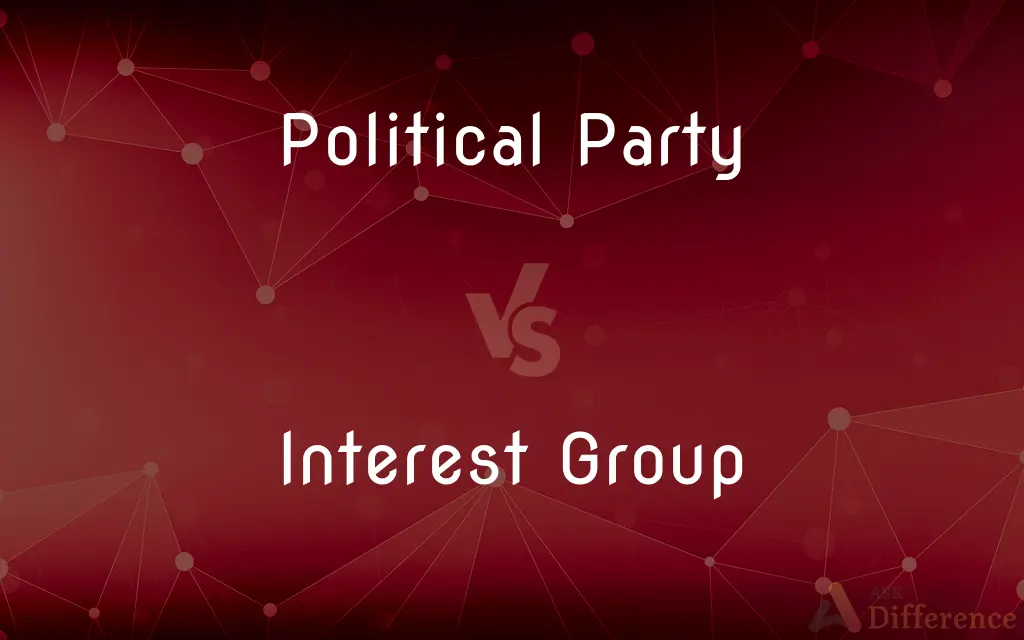Political Party vs. Interest Group — What's the Difference?
By Tayyaba Rehman — Published on December 31, 2023
A Political Party seeks to gain power through elections, whereas an Interest Group aims to influence public policy without seeking electoral power.

Difference Between Political Party and Interest Group
Table of Contents
ADVERTISEMENT
Key Differences
A Political Party is a group organized with the primary goal of winning political power by participating in elections and forming a government. Their influence spreads across many issues and they present a broad platform that reflects their philosophies and goals for governance. In contrast, an Interest Group is an organized body that seeks to influence public policy on specific issues, without the intent to participate in the actual governance process.
Political Parties have a broader mandate, aiming to represent a wide range of interests and ideologies of their supporters. They are structured to contest elections and potentially run a government. An Interest Group, however, focuses on specific issues, such as environmental concerns, gun rights, or healthcare. They lobby policymakers and mobilize public opinion to serve their specific cause or interest.
Members of a Political Party typically align with its overarching philosophy, principles, and platform, spanning various policy areas. Members might run for office, participate in campaigns, or vote according to the party's line. On the other side, members of an Interest Group are bound together by a shared concern or interest and work mainly through advocacy, lobbying, and public awareness campaigns, without direct participation in elections.
Lastly, while a Political Party usually has a mass membership and operates on a national or regional scale with a comprehensive agenda, an Interest Group can be smaller, sometimes local, and centered around its particular cause or issue, pushing for changes in policies or laws that align with their specific objectives.
Comparison Chart
Primary Goal
Gain political power through elections.
Influence public policy on specific issues.
ADVERTISEMENT
Focus
Broad range of issues and policies.
Specific issues or causes.
Participation in Elections
Direct, by running candidates.
Indirect, through advocacy and lobbying.
Membership
Mass membership, broad base.
Can be smaller, centered around specific interests.
Representation
Represents broad ideologies and platforms.
Represents specific interests or concerns.
Compare with Definitions
Political Party
A group with a broad platform and shared ideologies.
The Green Party focuses on environmental issues and policies.
Interest Group
A body lobbying policymakers on particular matters.
The National Rifle Association lobbies for gun rights.
Political Party
A body participating in elections to form a government.
The Republican Party has a significant presence in many state legislatures.
Interest Group
An organization mobilizing public opinion for a cause.
AARP, an interest group, represents the needs of older Americans.
Political Party
An organized group aiming for political power.
The Democratic Party is a major political party in the U.S.
Interest Group
An entity working to influence decisions on specific topics.
The Chamber of Commerce is an interest group representing businesses.
Political Party
A collective seeking to represent citizens in governance.
Many members of the Libertarian Party advocate for limited government intervention.
Interest Group
An organization promoting specific issues or causes.
The Sierra Club is an interest group focused on environmental conservation.
Political Party
An entity contesting elections to influence national policy.
The Progressive Party emerged as a force during the early 20th century.
Interest Group
A group advocating for changes in specific policies.
Human Rights Watch is an interest group emphasizing global human rights issues.
Common Curiosities
Can someone be part of both a Political Party and an Interest Group?
Yes, individuals can support a Political Party and be active in an Interest Group simultaneously.
How does a Political Party influence policy?
A Political Party influences policy by winning elections and implementing its platform.
How do Interest Groups advocate for their causes?
Interest Groups use lobbying, public campaigns, and advocacy to influence policymakers.
How does an Interest Group differ from a Political Party?
An Interest Group focuses on specific issues and lobbies for them, while a Political Party seeks electoral power with a broader agenda.
What is a Political Party's main objective?
A Political Party aims to win elections and gain political power.
How are Political Parties funded?
They are often funded through donations, public funding, and fundraising events.
Can Interest Groups have a significant impact on legislation?
Yes, through effective lobbying and advocacy, Interest Groups can influence legislative outcomes.
What's an example of an Interest Group focused on health?
The American Medical Association is an Interest Group representing physicians.
Can Political Parties change their platforms?
Yes, Political Parties can evolve and modify their platforms based on changing societal needs and views.
Do all countries have a two-party system like the U.S.?
No, many countries have multi-party systems where multiple Political Parties have significant representation.
Are Political Parties essential for democracy?
While not mandatory, Political Parties often play a vital role in representing citizens and ensuring diverse views in democracies.
Can Interest Groups support or oppose Political Parties?
Yes, Interest Groups can endorse or oppose Political Parties based on alignment with their issues.
Are members of Political Parties always in agreement?
No, there can be internal disagreements within a Political Party on various issues.
Can Interest Groups operate internationally?
Yes, some Interest Groups, like Amnesty International, operate on a global scale, addressing international concerns.
Do Interest Groups have political affiliations?
While some Interest Groups might lean politically, they primarily focus on specific issues regardless of party lines.
Share Your Discovery

Previous Comparison
Plant Fats vs. Animal Fats
Next Comparison
Badgers vs. BeaversAuthor Spotlight
Written by
Tayyaba RehmanTayyaba Rehman is a distinguished writer, currently serving as a primary contributor to askdifference.com. As a researcher in semantics and etymology, Tayyaba's passion for the complexity of languages and their distinctions has found a perfect home on the platform. Tayyaba delves into the intricacies of language, distinguishing between commonly confused words and phrases, thereby providing clarity for readers worldwide.
















































